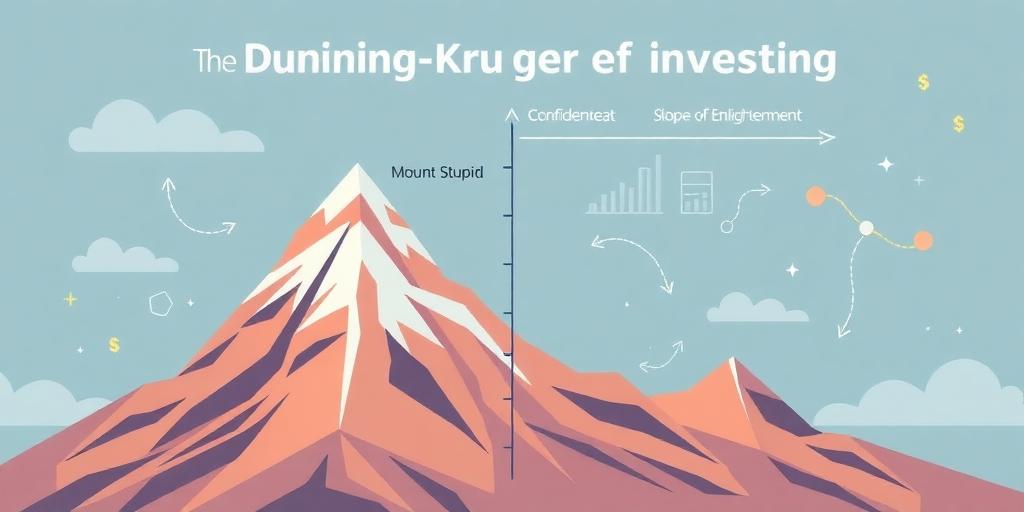Dunning-Kruger in Investing: The Less You Know, The More Confident You Feel?
Have you ever noticed how some of the most confident investors seem to make the riskiest decisions, while seasoned pros often approach the market with cautious analysis? This phenomenon might be explained by the Dunning-Kruger effect, a cognitive bias where individuals with low competence in a subject overestimate their ability. Let's explore how this bias can impact your investment journey and what you can do to mitigate its effects.
What is the Dunning-Kruger Effect?
First identified by David Dunning and Justin Kruger in 1999, the Dunning-Kruger effect is a psychological bias where people with limited knowledge or skills in a specific area tend to believe they are more competent than they actually are. Conversely, experts often underestimate their abilities because they assume others have a similar understanding. This leads to a situation where the least skilled individuals are the most confident, while the most skilled are the least.
How the Dunning-Kruger Effect Manifests in Investing
In the world of investing, the Dunning-Kruger effect can have significant consequences. Here’s how it typically plays out:
- Overconfidence in Novice Investors: New investors, often armed with limited information from a few articles or online courses, may feel ready to conquer the market. They might jump into complex strategies, like options trading or investing in highly volatile stocks, without fully understanding the risks involved.
- Ignoring Expert Advice: Believing they have unique insights, novice investors might dismiss the advice of experienced financial advisors or ignore well-established investment principles.
- Poor Risk Assessment: Due to their inflated sense of knowledge, they often underestimate the potential for losses and overestimate their ability to pick winning stocks.
- Chasing Quick Wins: They are more likely to fall for get-rich-quick schemes or hype-driven investments, thinking they have the skills to time the market perfectly.
Examples of Dunning-Kruger in Investing
- The Cryptocurrency Craze: Many individuals with little to no understanding of blockchain technology jumped into the cryptocurrency market during its peak, driven by hype and the fear of missing out (FOMO). When the market crashed, many of these investors suffered significant losses.
- Meme Stock Mania: The surge in meme stocks like GameStop and AMC saw many inexperienced investors pouring money into these companies, believing they could outsmart hedge funds. The reality was far more complex, and many were left holding the bag when the hype died down.
- Day Trading Gambles: Newcomers, drawn by the allure of quick profits, often engage in day trading without grasping the intricacies of market analysis, technical indicators, or risk management. This often leads to impulsive decisions and substantial losses.
Mitigating the Dunning-Kruger Effect in Your Investment Strategy
Recognizing the Dunning-Kruger effect is the first step in preventing it from derailing your investment strategy. Here are some practical steps to consider:
- Embrace Continuous Learning: Never stop learning about investing. Stay updated with market trends, economic indicators, and investment strategies. Read books, attend webinars, and follow reputable financial news sources.
- Seek Expert Advice: Consult with a qualified financial advisor who can provide objective advice tailored to your financial goals and risk tolerance. A good advisor can offer insights and help you avoid common pitfalls.
- Start Small and Diversify: Begin with a small investment portfolio and gradually increase your exposure as you gain more knowledge and experience. Diversification is key to spreading risk and protecting your capital.
- Practice Self-Awareness: Regularly assess your investment decisions and be honest about your knowledge gaps. Avoid overconfidence and be willing to admit when you don't know something.
- Keep a Journal: Document your investment decisions, including the reasons behind them. Review your journal periodically to identify patterns of behavior, biases, and mistakes. This practice can provide valuable insights into your decision-making process.
- Focus on Long-Term Goals: Shift your focus from short-term gains to long-term financial goals. A long-term perspective encourages patience, discipline, and a more rational approach to investing.
Conclusion
The Dunning-Kruger effect is a cognitive bias that can significantly impact your investment outcomes. By recognizing this bias and taking proactive steps to mitigate its effects, you can become a more informed, rational, and successful investor. Remember, humility, continuous learning, and expert advice are your greatest allies in navigating the complexities of the financial markets. Don't let overconfidence lead you astray; instead, strive for competence grounded in knowledge and experience.









